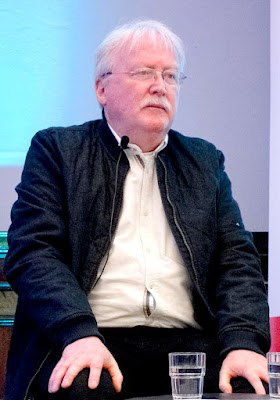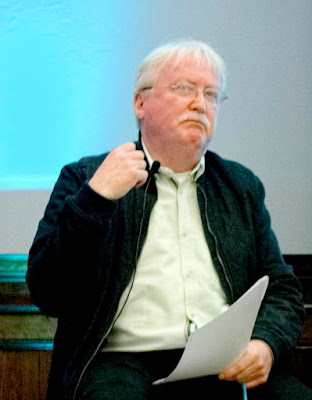Saturday, April 20, 2019
BANNED
Tommy Graham, editor of History Ireland, has been organising Hedge Schools from a good while back. The term originates with informal schools set up for Catholics in penal times. Some of these provided a first class education.
I am not aware of the religious, or otherwise, convictions of the audience on this occasion (9/4/2019) in the National Library of Ireland, but they were a lively lot.
This Hedge School was about censorship and was structured around Edna O'Brien's trilogy Country Girls which was banned in Ireland in the 1960s and which is currently the choice for Dublin City Council's One City One Book initiative.
First to introduce the panel, right to left in this case.
Donal is a history gruaduate, best known as a co-author of the fabulous Dublin blog Come Here to Me!. He has recently finished a stint as a Historian in Residence at Dublin City Library and Archive.
Mary need no introduction to my generation, having been to the forefront of the Women's Liberation Movement in the 1960s. Her Wiki page tells me she is currently an "author, broadcaster, playwright and journalist" but also points out that "She has modified the radical ideas of her past, but not rejected feminist principles".
Mary, of course, was on the Contraceptive Train to Belfast when a number of prominent women went up there to buy The Pill and bring it back to town in a glare of publicity. I think I remember her saying recently that they did not succeed in getting the pills and came back with a stock of Aspirin substitutes which they passed off and which fooled the cameras, and the Customs Officers. I'm sure that story must be in print somewhere.
It reminded me of The Rose Tattoo and the non-existent frenchie, but that's another story.
Tommy is, as always, tonight's MC, or as the French would put it "animateur".
I had not come across Angela before. She has a PhD from DCU where her thesis was on 'An investigation into contemporary online anti-feminist movements' and she published a well received book in 2017 entitled Kill All Normies
You can get a flavour of her writing and current preoccupation from this piece from Atlantic in December 2017.
Niall is Head of Journalism at Griffith College.
I'm not going to report the various contributions in detail as you can hear the full podcast here. I'll just give a flavour of the contributions below.
Tommy had Mary kick start the evening with a censorship timeline from the foundation of the state to the present day, well, the 1960s when she was most active and the traditional system began to crumble at the edges or shake at the foundations, have it as you will.
She evinced great admiration for Edna O'Brien who she felt broke the old mold. I have not read Country Girls but Mary quotes Edna describing her father as a drunken brute, so I can accept the trilogy as mold-breaking in more ways than one. Of course it was Edna O'Brien's fame, or to put it another way, access to foreign outlets, that brought the thing to a head. Many before her had the potential to crack the mold but they lacked the hammer of exposure.
Mary also mentioned the Lady Chatterley trial in 1960 which gave a wider public access to this literary work. The hard-cover version had not been banned in the UK but its price kept it out of the paws of the proletariat. When Penguin Books published an unexpurgated paperback version all hell broke loose and they were prosecuted. Fortunately the prosecution lost the case and the paperback became widely available.
Of course the publicity had a perverse effect and a work written to extol the beauty and joys of sex was then being bought for the "dirty bits". I have to admit that this was true in my case but it turned out to be a very disappointing and potentially embarrassing purchase (see below).
Mary also mentioned that very few books were banned on the initiative of the Censorship Board itself. They mostly resulted from complaints by the (predominantly Catholic) laity.
The title of this Hedge School is Censorship in Ireland - Then and Now. We've heard a lot about THEN and are in serious danger of forgetting about the NOW. It's not always called censorship, more likely trolling or no platforming but we are every bit as much in favour of censorship now as people then and this is Angela's area - anti-feminism, the rise of the alt-right and so on.
But, as Angela pointed out, there are things going on that we don't notice and take for granted. She reminds us that the Amazon monopoly is a huge censor and that we rely on one monopoly search engine online, Google. And how do Twitter and Facebook assess tweets, posts and comments as fit for posting.
Conformity is now managed by social media platforms. Censorship no longer has to mean State censorship. And I know, myself, from comments I see and complaints about others, that these screening processes can be both arbitrary and biased.
And the alternative? The chaos of the internet - very destabilising and terrifying.
Much food for thought here.
Edna O'Brien thrived because there were alternative media by then for her to get exposure and attitudes were changing.
In preparation for the session, Niall had trawled through the Irish Newspaper Archive online to gauge public reaction to Edna O'Brien at the time of the publication of Country Girls. The archive covers both national and provincial papers with the exception of the Irish Times which has its own separate archive.
Niall found that there was virtually no hostility among the public generally to Edna O'Brien.
In earlier times, people's careers were blighted by censorship & they were embittered - he mentioned Patrick Kavanagh & Flann O'Brien.
In assessing the role of the Church in relation to censorship and such matters, you need to be aware that the Church had a system of control, often exercised through the laity, while they sat back and let it take its course. This system started to break down in the 1960s.
Donal was anxious to raise the question of political censorship, particularly as we are aware of sex based censorship and often boast how it was not political. But what about Section 31 which Donal saw as in a world class of its own.
He also drew attention to how their books being censored affected different authors. For Edna O'Brien it was almost a badge of honour, while John McGahern was devasted when The Dark was banned.
Donal is curating an exhibition on censorship at Dublin City Library and Archive in Pearse Street. It is provocatively titled: Evil Literature: Banned Books in Our Collection. It runs till end-May 2019 and is well worth a visit.
So it's onward and upward to the Q&A.
I kicked off the Q&A by reading out my certificate (above).
I also recounted my purchase of Lady Chatterley in Jersey in 1961, how it had been taken from me at Dún Laoghaire on my return and how I went through a period of utter panic when I thought I might end up the centrepiece of an Irish trial in the matter.
I referred to informal systems of censorship in the Dublin diocese and in UCD and to the book-burning of Seán Fagan's book in more recent times. However I also evoked changing times with the survival of multiple copies of the book in the public library system. The symbiosis of Church and State had surely exploded.
You can listen to the full podcast (including the Q&A) at the bottom of this page.
My contribution is at 49:18.
This is my third Hedge School. I have reported on my two previous attendances on Nelson's Pillar and The Somme.
Subscribe to:
Post Comments (Atom)












No comments:
Post a Comment
Bona fide comments only. Spamming, Trolling, or commercial advertising will not be accepted.